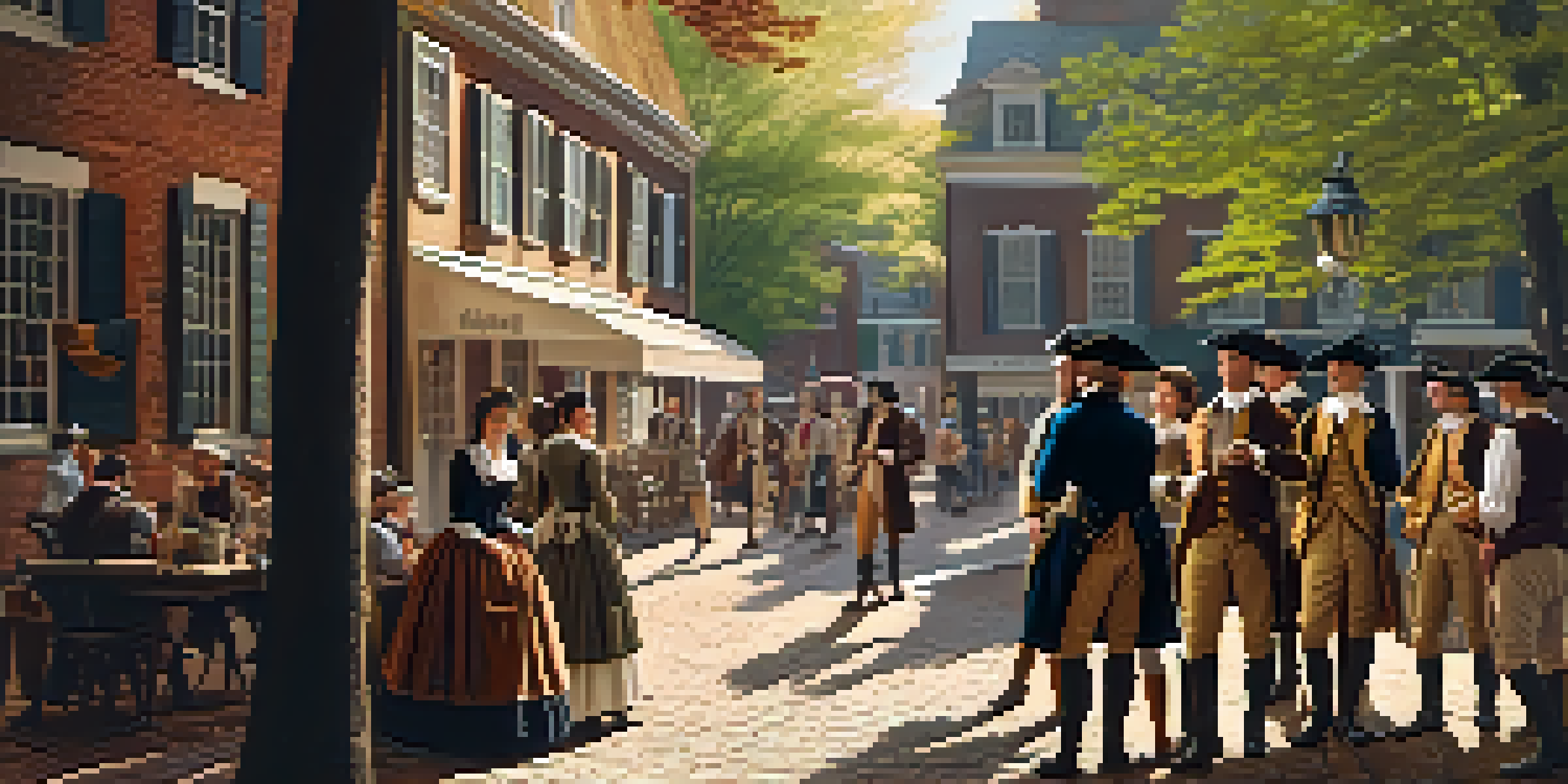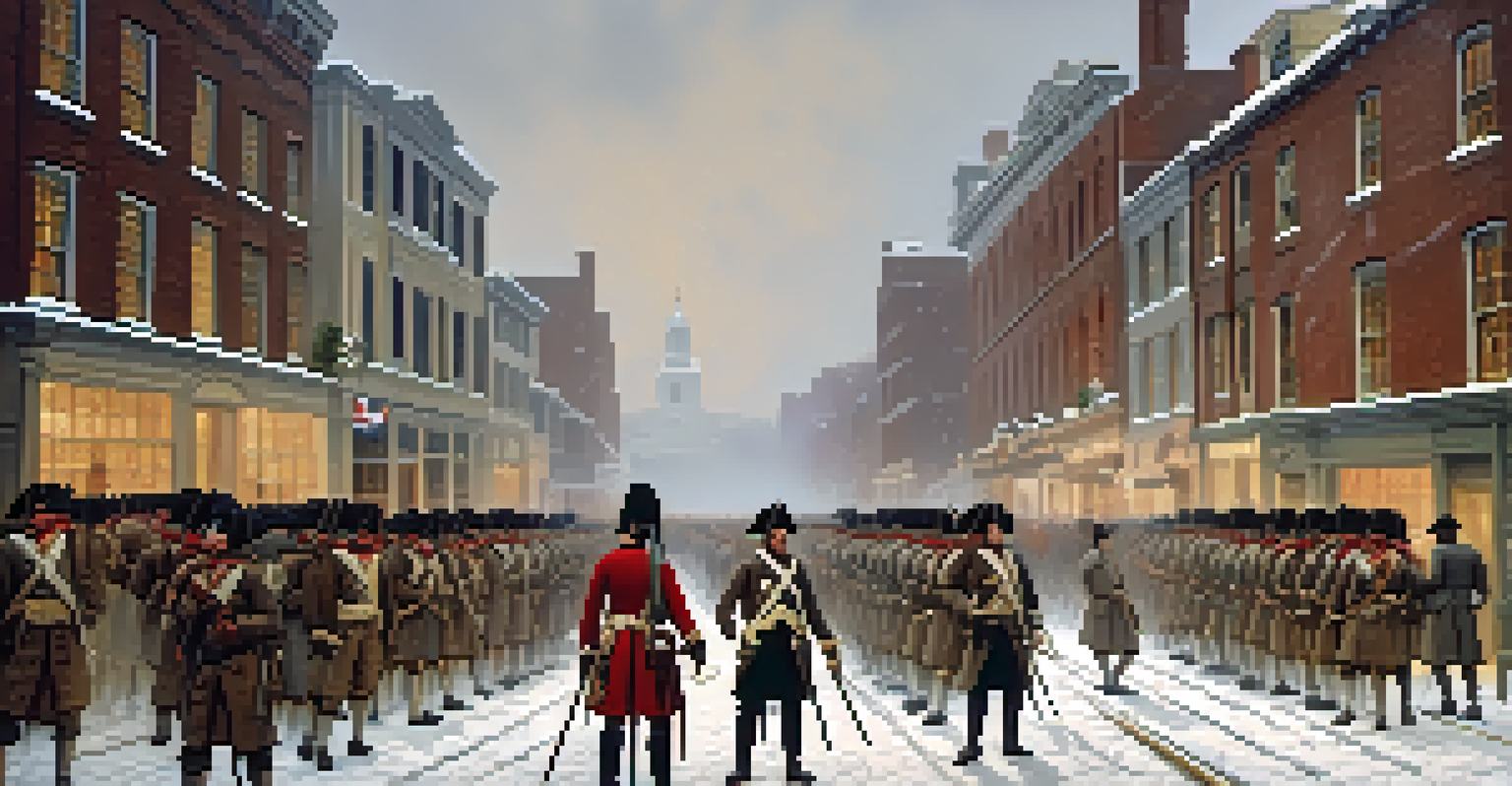Boston's Crucial Role in the American Revolution Explained

Boston: The Spark of Revolutionary Ideas
In the years leading up to the American Revolution, Boston became a hotbed of revolutionary thought. It was here where ideas of freedom and self-governance began to take root, inspired by Enlightenment thinkers. The Boston Enlightenment was not just about philosophy; it influenced ordinary citizens who began questioning British authority.
A revolution is not a bed of roses. It is a struggle between the future and the past.
The Bostonian intellectuals gathered in coffeehouses and salons, discussing the implications of British taxes and restrictions. These discussions weren't just idle chatter; they were the seeds of rebellion that would soon grow into a full-fledged revolution. The atmosphere was charged with a sense of urgency and purpose, uniting the colonists in a common cause.
As tensions escalated, Boston emerged as a symbol of resistance. It was the catalyst that would inspire other colonies to join the fight for independence, proving that a single city could indeed change the course of history.
The Boston Tea Party: A Defiant Protest
One of the most iconic events in American history, the Boston Tea Party, took place in December 1773. Colonists, frustrated by the Tea Act, which granted the British East India Company a monopoly on tea sales, decided to take a stand. They dressed as Native Americans and dumped 342 chests of tea into Boston Harbor, a bold act of defiance.

This event wasn't just about tea; it was a protest against taxation without representation. By destroying the tea, the colonists were sending a clear message to the British government: they would not be pushed around. The Boston Tea Party galvanized support for the revolutionary cause, making it a rallying point for those who sought independence.
Boston Ignites Revolutionary Ideas
The city's vibrant discussions and gatherings laid the groundwork for a unified resistance against British authority.
In response, the British enacted punitive measures known as the Coercive Acts, which further inflamed tensions. Instead of quelling the rebellion, these actions only united the colonies against British rule, demonstrating how a single act of defiance could spark a larger movement.
The Boston Massacre: Turning Point of Tension
On March 5, 1770, the Boston Massacre occurred, marking a turning point in colonial resistance. A confrontation between British soldiers and colonists escalated, resulting in the tragic death of five civilians. This incident shocked the public and was used as powerful propaganda by revolutionary leaders.
Liberty, when it begins to take root, is a plant of rapid growth.
Paul Revere's famous engraving depicted the event as a brutal massacre, stirring emotions across the colonies. It transformed the narrative from mere taxation issues to a fight for survival against tyrannical oppression. The Boston Massacre became a symbol of British cruelty and galvanized support for the revolutionary cause.
In the aftermath, the colonists rallied together, further entrenching their resolve to resist British authority. This poignant moment in Boston's history highlighted the dangers of unchecked power and the lengths to which ordinary people would go to defend their rights.
The Role of Boston's Sons of Liberty
The Sons of Liberty, a secret organization formed in 1765, played a crucial role in mobilizing resistance against British rule. They organized protests, boycotts, and public demonstrations, creating a network of communication among the colonies. This group was instrumental in spreading revolutionary ideas and fostering a sense of unity.
Their actions ranged from peaceful protests to more aggressive tactics, such as the intimidation of British officials. They were not just activists; they were also community organizers who understood the power of grassroots movements. The Sons of Liberty helped to transform the resistance from isolated incidents into a widespread revolutionary movement.
Defiance at the Boston Tea Party
The Boston Tea Party became a pivotal protest against taxation without representation, rallying colonists to the revolutionary cause.
The legacy of the Sons of Liberty is evident in the very fabric of American democracy. They demonstrated that ordinary citizens could challenge authority and effect change, inspiring future generations to stand up for their rights.
Boston as a Revolutionary Hub
Boston's strategic location and vibrant community made it a natural hub for revolutionary activities. With its bustling port and educated populace, the city became a focal point for organizing and planning the revolution. Key figures like Samuel Adams and John Hancock emerged from Boston, providing leadership and direction.
The city hosted several significant events, including the First Continental Congress in 1774, where representatives from the colonies gathered to coordinate their response to British policies. This gathering underscored Boston's integral role in uniting the colonies under a common cause, setting the stage for collective action.
Boston's influence extended beyond its borders, as its revolutionary fervor inspired other cities to take a stand. The city's contributions were vital in shaping the strategies and philosophies that would define the American Revolution.
The Siege of Boston: A Crucial Standoff
The Siege of Boston, lasting from April 1775 to March 1776, marked a critical phase in the Revolutionary War. After the battles of Lexington and Concord, colonial forces surrounded the city, effectively cutting off British troops from reinforcements and supplies. This standoff put Boston at the center of the fight for independence.
During this period, the Continental Army, led by George Washington, worked tirelessly to fortify positions around the city. The siege demonstrated the resilience and determination of the colonists, as they faced a well-equipped British army. It was a test of strategy, endurance, and the will to fight for freedom.
Legacy of Boston's Resistance
Boston's significant role in the American Revolution established it as a symbol of freedom and the ongoing fight for rights.
The eventual withdrawal of British forces from Boston in March 1776 was a significant victory for the revolutionaries. It served as a morale boost and solidified Boston's status as a symbol of resistance and determination in the quest for independence.
Boston's Legacy in American History
Boston's role in the American Revolution left an indelible mark on the nation's history. The events that unfolded in this city helped shape the ideals of liberty, justice, and democracy that the United States holds dear today. Boston became synonymous with resistance and the fight for self-governance.
The city continues to celebrate its revolutionary heritage through museums, historical sites, and annual reenactments. These efforts ensure that the sacrifices made by those early patriots are not forgotten. Visitors can walk the Freedom Trail, exploring the very streets where history was made.

Boston's legacy serves as a reminder of the power of unity and the importance of standing up against oppression. It teaches us that the fight for rights and freedoms is an ongoing journey, one that requires vigilance and commitment from every generation.